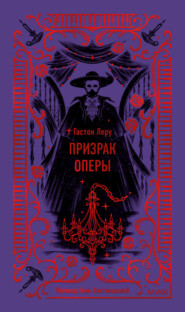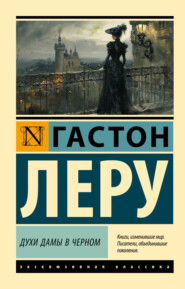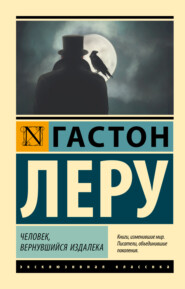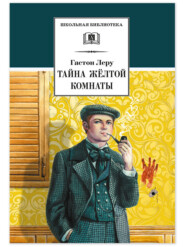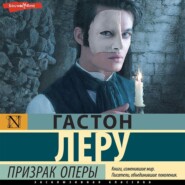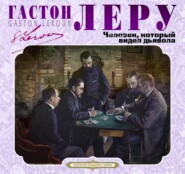По всем вопросам обращайтесь на: info@litportal.ru
(©) 2003-2024.
✖
The Bride of the Sun
Автор
Год написания книги
2018
Настройки чтения
Размер шрифта
Высота строк
Поля
“I knew you would come back here if you were still alive.... But is it really you, Dick?… Really you?”
“Maria-Teresa has been awfully ill,” explained the child, while the two old ladies cried. “But we cured her by telling her you were not dead. Of course I knew Huascar had saved you too.... Huascar saved us all, you know.... He took us away from all those nasty Indians.... And father said that we should all be dead but for him. Didn’t you, Father?… But now you mustn’t die any more, must you?”
“I was there, Maria-Teresa. I saw them put you into the tomb.”
“You were there, then! I knew it. I felt your eyes on mine, and that’s why I looked. I knew you were watching… somewhere.... When they took Christobal away from me I thought I should die… Huascar had told me he would be quite safe, but I couldn’t believe it.... Then that horrible cry!… I didn’t open my eyes again until I felt yours on them.... I knew you were there, dear.”
The two old ladies and the Marquis were making desperate signs to him, and Dick tried to stop her, but she went on:—
“I knew you wouldn’t leave me there to die, and so I waited, waited.... It was terribly long.... And then I began to choke.... I couldn’t move; only sit there and wait… What does it matter, Father, now that we’re all alive and happy?… Then I heard somebody thundering blows on the wall, and thought you were coming.... Only just in time, for I was choking.... There was such funny music in my ears.... Then I heard the stone torn away, and felt myself being lifted out.... When I opened my eyes, Dick, it was not you, but Huascar.... He carried me into a dark little room, with a torch burning in it, and untied my arms and head.... Then he slipped on that horrible bat-skin dress again.... I couldn’t believe I was saved, though he told me so....”
She paused for a moment, choking, and continued:
“He left me where I was, and started working. First he lifted a mummy into my place. ‘There is no sacrilege,’ he said, ‘for the god now has the number of wives he needs.’… He had evidently prepared everything, and dug an opening as deep into the back of my tomb as he dared.... I was horribly afraid, because he said he had done it all for love of me… and I screamed when he tried to pick me up.... I was ever so much more afraid than in the tomb.... He laughed, and said I was lucky to have had him for a friend.... You, he said, had nearly spoiled his plans, and he had had to trap you all to save me.
“When I told him that he had only saved me for a worse fate, he laughed again.... Then he picked me up, for I was too weak to move, and carried me miles and miles through the darkness.... When he stopped, it was before a low door.... He pushed it open, and there were father and Christobal.... While they were kissing me, Huascar went to the door.... He looked awful.... Then he said to father: ‘Señor, I promised to return your son and daughter to you. Here they both are. You will find nothing to prevent your departure. An Inca, señor, never breaks his word.’… We have not seen him since.... I had to tell you, Dick, so that if ever you meet that man again, you will know what we owe him.”
At her last words, the young engineer shivered and pressed her hand.
“He need not be afraid. I remember what I owe him. He saved both of you and us, dear, and I promised him that if he saved you....”
“I know, I know! Father has told me....”
“He considered: your promise an insult,” interrupted the Marquis. “After my capture, they took me to the Island, and he came to see me in my dungeon. I thought my last hour had come, and did not spare him with my tongue. He let me finish, and then explained what he had done, his whole plan of action. When Maria-Teresa and Christobal were brought to me, the two Indians guarding my door, who were his absolute slaves, would take us both to the mainland in a pirogue. He told me, too, of your interview at Arequipa, and gave me a message for you. Here it is:
“‘Tell that young man, whom I do not know, that the señorita will be as free as her heart, which is mine neither to take, to buy nor to sell. He must know that. I have done him no harm, and he has insulted me. I forgive him.’
“Then, as he was about to go, he turned again:—
“Do not thank me, señor. Thank the one who is now in heaven, and who was the señora de la Torre. I ask for only one thing in exchange for my services, and that is for you never to speak of them. The memory of the High Priest of the Incas must not be dishonored.’
“That is Huascar’s message, Dick. There is no reason why you should not marry Maria-Teresa.”
At this moment Uncle Francis and Natividad dashed into the room. On their way from the harbor, they had learned of the Marquis’ miraculous return to Lima with his two children, and hearing that the whole family had come to Callao that day—Maria-Teresa to see her dear old office for the last time!—they had come there running. Aunt Agnes and Irene, anxious for their charge’s health, would have taken her away, but the young girl insisted that this storm of still shaky laughter and interjections was the best medicine for her malady.
“It’s all a bad dream,” she said. “That is how we must take it.”
Don Christobal took up the cue.
“Exactly. I have had a long talk with Veintemilla, and that is the way he asks us to treat it, for patriotic reasons. In exchange, he has promised to help me wind up the business here and sell our concessions. Dick and Maria-Teresa will be married in England, if nobody objects.”
Natividad alone had objections to make, and waved his arms disconsolately above his head.
“The same old story!” he groaned. “If I had my way, we should soon get to the bottom of those Corridor of Night mysteries.... But no!… the same old game of shut your eyes and see nothing.... Here’s Veintemilla now, instead of settling with those Indians once and for all, asking us to call it a bad dream!… Bad dream indeed!”
“My dear Natividad,” said the Marquis. “I fear you are a troublous spirit. By the way, I have sad news for you. You are no longer inspector superior of Callao.”
Natividad fell into a chair, his mouth wide open, struggling for words to qualify the airy attitude of this man, for whom he had risked everything. He was so comical that they all burst into laughter, while the little old gentleman, purple with fury, strode toward the door.
“Not so quick, Natividad, not so quick!” called the Marquis after him. “There is also some good news for you. You have been appointed inspector superior at Lima.”
Again Natividad fell into a chair, but beaming, stuttering with joy and gratitude.
“It’s a dream.... the dream of my life.... I might have been dead though!”
“The appointment, which I saw President Veintemilla sign, is, of course, only valid in the event of your being living,” smiled the Marquis. “As those Indians of yours haven’t eaten you alive, you can keep an eye on them again.”
“Hush! We must not talk about it,” replied Natividad, the magistrate’s toga weighing on his shoulders again.
“And neither shall we,” whispered Dick, bending over Maria-Teresa’s pale face.
She nodded slowly. “Do you know, Dick, looking round me and seeing the same old chairs and books again, the same dear faces, and when I think of the Temple of Death, it really does only seem like an ugly dream.”
Natividad, having said good-by to all, was talking to the Marquis by the door. He opened it and fell back with a muffled exclamation.
A corpse, until then held upright by the closed door, fell into the room. Maria-Teresa, first to realize what it was, fell on her knees beside the body.
It was Huascar, whom she had driven out of that door and who had dragged himself there to die, a dagger in his heart.
EPILOGUE
This story must have an epilogue, for I have not yet had occasion to speak again of Oviedo Runtu, bank-clerk and last King of the Incas. After a thousand adventures in the Andes, which I may describe to you some day, Oviedo Runtu and his lieutenants in the revolt with Garcia were tracked down by Natividad’s police.
Oviedo Runtu surrendered and saved his life by promising to quench the last embers of revolt. Tried by court-martial, he was sentenced to perpetual exile, but Natividad subsequently interceded and obtained his pardon. It was, moreover, the new Chief of Police of Lima who secured him a post at Punho, in a branch of the Franco-Belgian bank. There Natividad could watch him, and finally convinced himself that the bank-clerk King did nothing to resuscitate the marvelous fêtes of the Interaymi.
Oviedo Runtu died very prosaically, after marrying a lady of Lima who had made the trip to Lake Titicaca specially to see the last King of the Incas. Of that journey was born a romance, and in after years travelers passing through Punho would have the royal couple pointed out to them. They were always very much amused when they heard that the King, working daily in a bank, earned just one hundred’ and fifty soles a month.
One day, when some charitable souls were chaffing the King’s widow about the mediocre state in which she lived, the Coya, as she was derisively called, retorted that had she and her husband so wished, they could have been the wealthiest couple on earth. But the treasures of the Incas, she added, belonged to the gods and the dead, and none might touch them.
Asked if she had ever seen those treasures, the Coya asserted that her husband had shown them to her once, and she told fabulous stories of the riches hidden in the Temple of Death.[1 - The anonymous author of the MS. “Antiy y monumentos del Peru” says:—“It Is widely known, and generally admitted, that there exists in the ancient fortress of the Cuzco a secret room In which is hidden a vast treasure, consisting chiefly of golden statues of all the Incas. A lady who has been in this room is still living. This is Doña Maria de Esquivel, wife of the last Inca. I have heard her tell how she was taken there.“Don Carlos, husband of this lady, did not live in a manner suited to his rank, and she often upbraided him, saying that she had been cozened into marrying a poor Indian under the pompous style of ‘Lord of the Incas.9 She said this so often that Don Carlos grew angry, and one day retorted: ‘Madam, I will show you whether I am rich or poor. Too will see that no lord, no monarch on this earth, has a greater treasure than I.’ Taking her to the ruined fortress, he bound her eyes, and led her only a few steps before removing the bandage again.“She was in a great quadrangular hall, and ranged all about it were the statues of the Incas, each about the size of a twelve-year-old child, and all of massive gold. She saw also many vases of gold and silver, the whole making one of the most magnificent treasures in the world.”] Naturally, nobody believed her.
Even so, none believed the soldiers of Pizarro when they said that in Peru their horses had been shod with silver!
THE END
notes
1
The anonymous author of the MS. “Antiy y monumentos del Peru” says:—
“It Is widely known, and generally admitted, that there exists in the ancient fortress of the Cuzco a secret room In which is hidden a vast treasure, consisting chiefly of golden statues of all the Incas. A lady who has been in this room is still living. This is Doña Maria de Esquivel, wife of the last Inca. I have heard her tell how she was taken there.
“Don Carlos, husband of this lady, did not live in a manner suited to his rank, and she often upbraided him, saying that she had been cozened into marrying a poor Indian under the pompous style of ‘Lord of the Incas.9 She said this so often that Don Carlos grew angry, and one day retorted: ‘Madam, I will show you whether I am rich or poor. Too will see that no lord, no monarch on this earth, has a greater treasure than I.’ Taking her to the ruined fortress, he bound her eyes, and led her only a few steps before removing the bandage again.
“She was in a great quadrangular hall, and ranged all about it were the statues of the Incas, each about the size of a twelve-year-old child, and all of massive gold. She saw also many vases of gold and silver, the whole making one of the most magnificent treasures in the world.”







